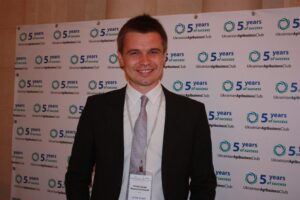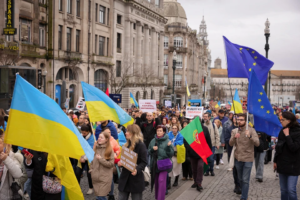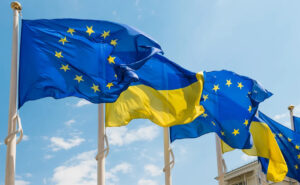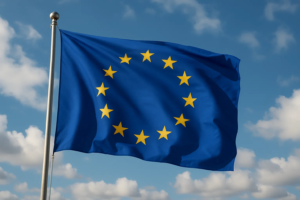
IMK Agricultural Holding supplies about 20% of agricultural products to the European Union market during 2022-2024 and 2025 and therefore depends on the European market and insights that it applies in practice, despite constant shelling and losses due to the war, said its CEO Oleksandr Verzhikhovsky.
“If we talk about the export of our products and take a look at 2022-2023-2024 and the current 2025, then about 20% of our exports went to the European market. These were mainly wheat and corn. We export 600,000 tons annually, and about 20% of that traditionally goes to the European market,” he said at a conference during the Agritechnika-2025 exhibition in Hanover, Germany.
Verzhikhovsky added that at the same time, there is a clear downward trend in the share of products supplied to the European market.
At the same time, he acknowledged that IMC depends on imports from the EU for all components of its agribusiness: fertilizers, plant protection products, and equipment.
“In fact, we are preparing to join the European community — in fact, for us, there is no alternative. We are preparing within the framework of the Smart Green Strategy, approved for 10 years until 2033. It is aimed at preparing for the high environmental standards dictated by the European market,” said the CEO of the agricultural holding.
The agroholding’s Smart Green Strategy aims to make agribusiness more environmentally friendly, which is an additional bonus to increasing efficiency. As an example, he cited the abandonment of plowing in the Poltava region due to the need to preserve moisture in the soil and reduce the carbon footprint.
Verzhikhovsky added that it is difficult to talk about further prospects at the moment due to the military actions in the regions where IMC operates.
According to him, it is extremely difficult to work due to constant power outages caused by Russian shelling of the Ukrainian power grid. IMC was forced to suspend grain drying due to a fire in the dryer after the shelling. In addition, a few weeks ago, as a result of a drone attack, the agricultural holding lost 200 cubic meters of diesel fuel at its enterprise in the Chernihiv region.
“Of course, we are moving forward with the Smart Green Strategy to implement the ‘green agenda’, but in between problems and the need to solve more urgent and routine issues imposed on us by the situation in which Ukraine lives and works,” summarized the SEO of IMC.
As reported, Alex Lissitsa, advisor to the directors of the agricultural holding, said that IMC will not launch new investment projects in 2026, but will allocate about $25 million to upgrade its equipment.
IMK Agroholding is an integrated group of companies operating in the Sumy, Poltava, and Chernihiv regions (northern and central Ukraine) in the segments of crop production, elevators, and warehouses. The land bank is 116,000 hectares, storage capacity is 554,000 tons, and the 2024 harvest is 864,000 tons.
IMK ended 2024 with a net profit of $54.54 million, compared to a net loss of $21.03 million in 2023. Revenue grew by 52% to $211.29 million, gross profit quadrupled to $109.10 million, and normalized EBITDA increased 25-fold to $86.11 million.

EU countries could save EUR250 billion annually by 2040 by accelerating the transition to electricity, according to a press release from France’s Schneider Electric.
“The so-called ‘energy trinity’ – the balance between affordability, security, and sustainability – remains a challenge, as high dependence on fossil fuel imports keeps prices high and delays the achievement of climate goals,” the company said.
According to a press release based on Schneider Electric’s report “Europe’s Energy Security and Competitiveness – Accelerating Electrification,” the current level of electrification in Europe is only 21% — a figure that has remained unchanged over the past decade and is 10% lower than in China, where rapid electrification is taking place. At the same time, the cost of energy for domestic consumers in the EU is EUR0.27 per kWh, in the US — EUR0.15/kWh, and in China — EUR0.08/kWh.
“This means that daily energy consumption for each EU citizen is three times more expensive than for Chinese residents,” the report’s authors concluded.
According to the document, the pace and level of electrification in different European countries vary significantly due to differences in infrastructure, policy, market maturity, and consumer behavior. In particular, some countries, such as the Scandinavian countries, have made significant progress in the electrification of transport and buildings, while others are only beginning to scale up their efforts. At the same time, Southern Europe shows higher rates of building electrification, while Western and Central Europe focus on industrial electrification and the development of prosumer initiatives.
“To remain competitive on the world stage, Europe needs to accelerate the transition to a more electrified economy,” according to Schneider Electric analysts.
The report identifies several key policy areas that need to be implemented to achieve this goal.
First and foremost, according to the authors of the document, governments need to reduce the price difference between electricity and natural gas by gradually phasing out fossil fuel subsidies and reforming the tax system to encourage the use of clean energy.
Equally important is accelerating financing — simplifying access to investment, introducing targeted incentives, especially for small and medium-sized businesses, and directing revenues from emissions trading and innovation funds to electrification projects.
The report also highlights the need to develop local markets, which involves mandatory electrification of new buildings and industrial processes, support for the rapid introduction of heat pumps and electric vehicles, and encouragement of prosumer initiatives.
In addition, an important direction is to promote local development through sustainable public procurement, accelerate standardization, and support European innovation and manufacturing—this will allow the economic and social benefits of electrification to be fully realized across the continent.
“This study is one of the most thorough analyses of Europe’s electrification potential and the policy actions needed to realise it. It emphasizes that electrification is vital — not only for achieving climate goals, but also for stimulating economic growth, energy independence, and industrial competitiveness,” said Laurent Bataille, Executive Vice President of Schneider Electric in Europe.
In his opinion, Europe must urgently overcome the stagnation of electrification, for which the relevant technologies already exist and are ready for implementation. At the same time, appropriate policy incentives and decisive business action are also needed to unlock the economic and environmental potential that EU countries need.

Ukraine may export an additional 46,000 tons of sugar to the EU as early as 2025, according to a statement by the National Association of Sugar Producers of Ukraine “Ukrtsukor” on its Telegram channel.
The industry association recalled that on October 29, 2025, an updated trade agreement between Ukraine and the European Union came into force, which provides for a 400% increase in the tariff quota for white sugar to 100,000 tons. As part of the agreements reached, the quota for the current year has also been revised, which will allow Ukrainian sugar producers to export an additional 46,625.8 tons of white sugar to the EU by the end of 2025.
According to Cabinet of Ministers Resolution No. 1368 of October 29, 2025, this volume will be distributed among exporters in proportion to the volume of exports of the specified products to the EU during January-May 2025.
Ukrtsukor specified that in October 2025, Ukraine exported 44.4 thousand tons of sugar worth over $20 million, of which only 2% was supplied to EU markets. Lebanon was the leader in terms of export volume, receiving 48% of all sugar. Syria and North Macedonia were also among the top three importers of Ukrainian sugar in October.

According to Eurostat, as of the end of July 2025 there are 4,373,455 citizens of Ukraine under temporary protection in EU countries. Over the month their number increased by 30,980 people, that is approximately by 0.71% compared to the June level — the dynamics are moderate but stable, indicating a continuing, though not surging, movement of people in search of safety. The overwhelming majority of beneficiaries of this regime — about 98.4% — are Ukrainians, which makes the group of aid recipients extremely homogeneous and requires focused integration measures.
The distribution by countries remains concentrated: the key burden is borne by Germany, Poland, and the Czech Republic. In Germany there are about 1,196,645 people — roughly 27.8% of the total; in Poland — about 992,505 people (around 23%); in the Czech Republic — about 378,420 people (about 8.8%). Taken together this is almost three-fifths of all recipients of protection, therefore it is precisely these economies and their social systems that first react to any changes in inflow: in large agglomerations the issues of housing affordability become acute, the need for school places and language courses grows, and municipal budgets face continuous obligations.
In such conditions, reception policy inevitably shifts to an integration agenda. Coming to the fore are the accelerated recognition of qualifications, intensive language programs, access to kindergartens and schools, as well as reskilling instruments. The labor market becomes the main shock absorber: the faster people move into formal employment, the lower the budgetary burden and the more noticeable the multiplier effect for domestic demand. At the same time, the housing issue remains the key risk: concentration in capital and industrial regions pushes rental rates upward and increases social tension. Effective responses appear to be targeted rent subsidies, accelerated renovation and construction of social housing, as well as a more even distribution of placements among municipalities.
Finally, the predictability of financing and interagency coordination at the EU and national government levels becomes critically important. Even with the current “soft” monthly increase, unreliable sources of funds quickly turn a manageable situation into a problem for local budgets. On the horizon of the coming months, the key indicators of resilience will be the growth rates of protection beneficiaries, the share of those employed, indicators of school and preschool integration, the dynamics of rental rates in concentration regions, and the speed of transition from emergency measures to long-term programs. Overall, the picture of stable but continuing growth with high concentration in Germany, Poland, and the Czech Republic requires shifting efforts from short-term aid to systemic integration — precisely this will make it possible to reduce budgetary costs and turn the humanitarian response into a sustainable socio-economic result.
EU, GERMANY, HOUSING, Labor market, MIGRATION, POLAND, REFUGEES, SOCIAL POLICY, TEMPORARY PROTECTION, UKRAINIANS

European Union leaders, noting Ukraine’s fulfillment of the conditions for opening negotiation clusters on EU accession, did not take the relevant decision due to Hungary’s position.
This follows from a statement on the conclusions agreed upon by 26 EU member states, except Hungary, following the consideration of the Ukrainian issue at the European Council meeting in Brussels on Thursday.
“The European Council reaffirms the EU’s unwavering support for Ukraine’s path to EU membership and welcomes the significant progress Ukraine has made so far under the most difficult circumstances,” the statement on the conclusions says.
In this regard, the European Council called on Ukraine, the Council, and the Commission to continue working on the accession process in accordance with a merit-based approach.
“The fundamental issues cluster will be opened first and closed last, and the clusters will be opened after the conditions have been met, in accordance with the enlargement methodology. The European Council takes note of the Commission’s assessment that the fundamental issues, internal market, and external relations clusters are ready to be opened,” the statement said.
The European Council will return to this issue at its next meeting.

The European Union is discussing the possibility of accepting new member states without granting them a full set of rights, including the right of veto, in order to speed up the enlargement process. This was reported by Politico, citing diplomatic sources in Brussels.
According to the publication, the proposal is at an early stage and requires unanimous approval from all 27 member states. Under the plan, candidate countries would be able to enjoy the main benefits of membership — access to the single market, EU funds, and political programs — but would only be granted veto rights and participation in certain decisions after the completion of institutional reforms in the European Union.
This refers, in particular, to a gradual transition from the principle of unanimous voting to a qualified majority mechanism, which would make it possible to bypass blockages by individual states.
Anton Hofreiter, chairman of the Bundestag’s European Affairs Committee, said that future members should “temporarily waive their veto rights until internal EU reforms are completed.”
“We cannot allow one or two countries to slow down the expansion of the Union,” the German MP stressed.
According to Politico, Austria and Sweden are among the supporters of the initiative, believing that such an approach would help overcome resistance from Budapest and some other capitals that fear losing influence and economic positions.
However, the idea has already met with resistance not only from Hungary, but also from France and the Netherlands, where concerns have been expressed about the “erosion” of the principle of equal membership.
Montenegro’s President Jakov Milatović commented to the publication that the enlargement process “needs to be revitalized,” recalling that Croatia was the last country to join the EU more than ten years ago.
European Commission President Ursula von der Leyen previously stated that EU enlargement remains a strategic priority and that Ukraine and Moldova could potentially join by 2030. However, most member states are currently refraining from speeding up the process.
On Wednesday, October 22, a summit will be held in London as part of the Berlin Process, where EU leaders will discuss with representatives of the Western Balkan countries further steps towards the region’s integration into the European Union.
According to Politico sources, the European Commission is also considering the option of conducting separate stages of negotiations with candidates without the need for unanimous agreement from all members, which would allow it to circumvent the risk of a blockade, primarily from Hungary.
Currently, Ukraine, Moldova, Serbia, Montenegro, North Macedonia, Albania, and Bosnia and Herzegovina have the status of candidate countries for EU membership. Turkey has been negotiating membership since 2005, but the process is effectively frozen.